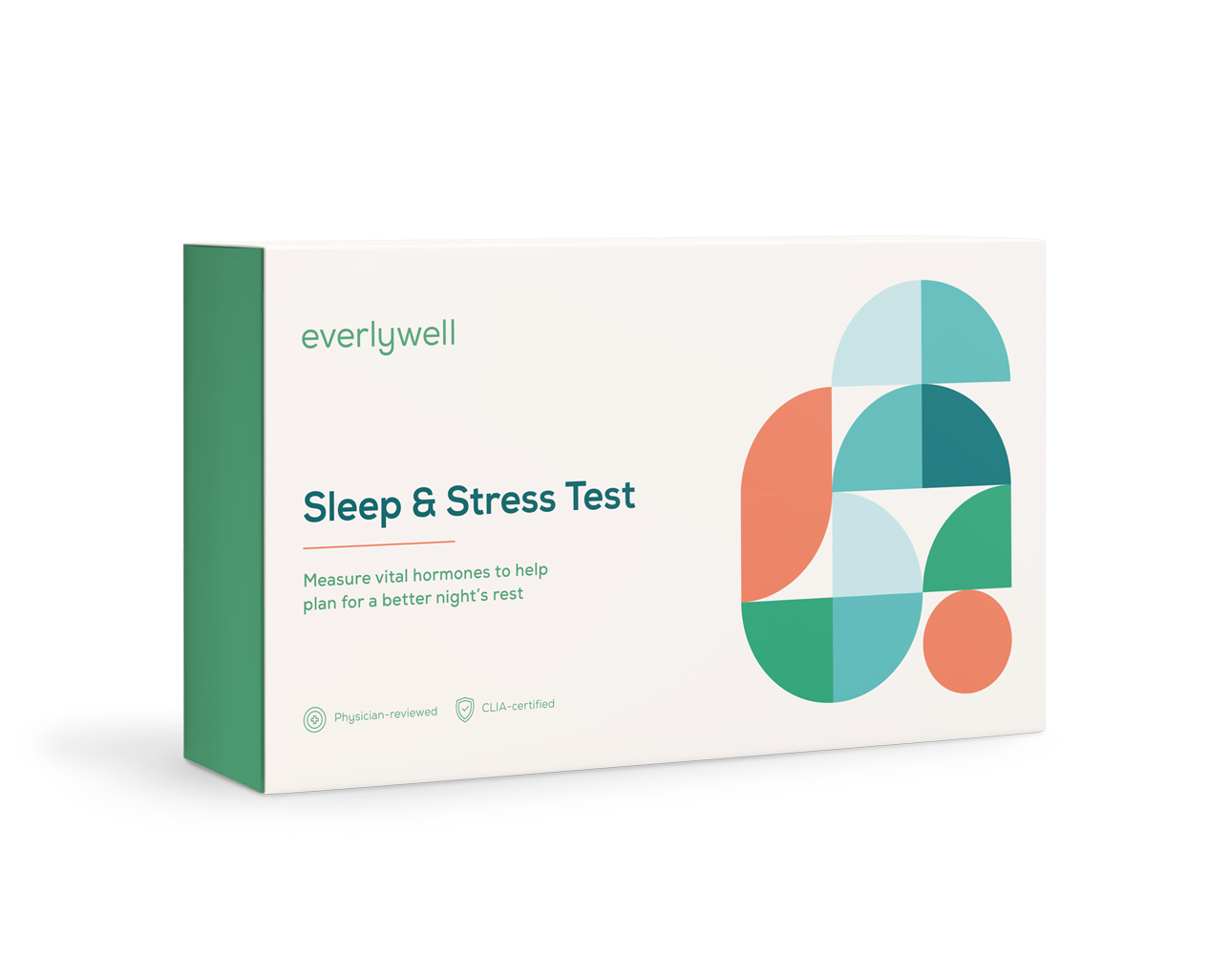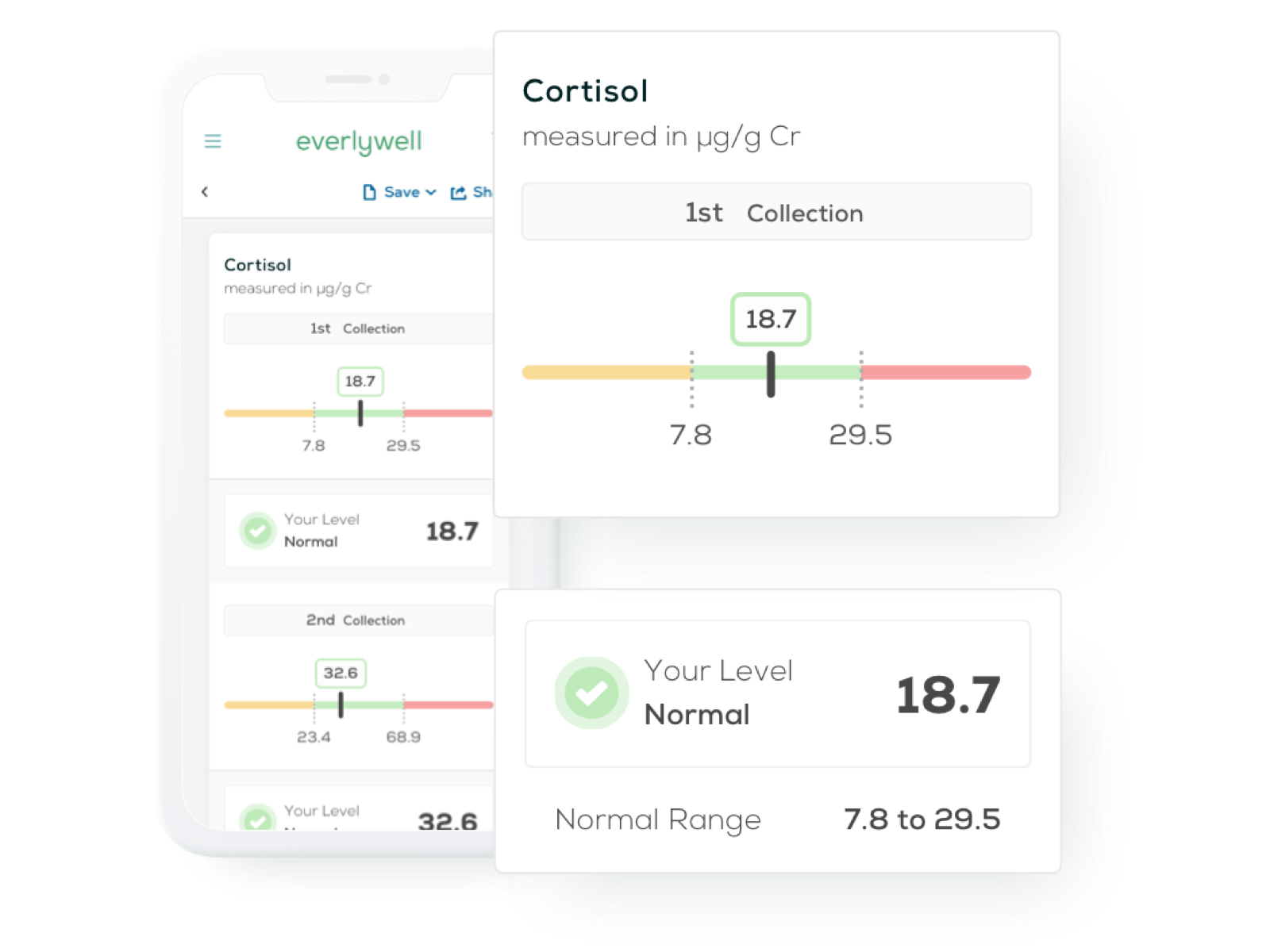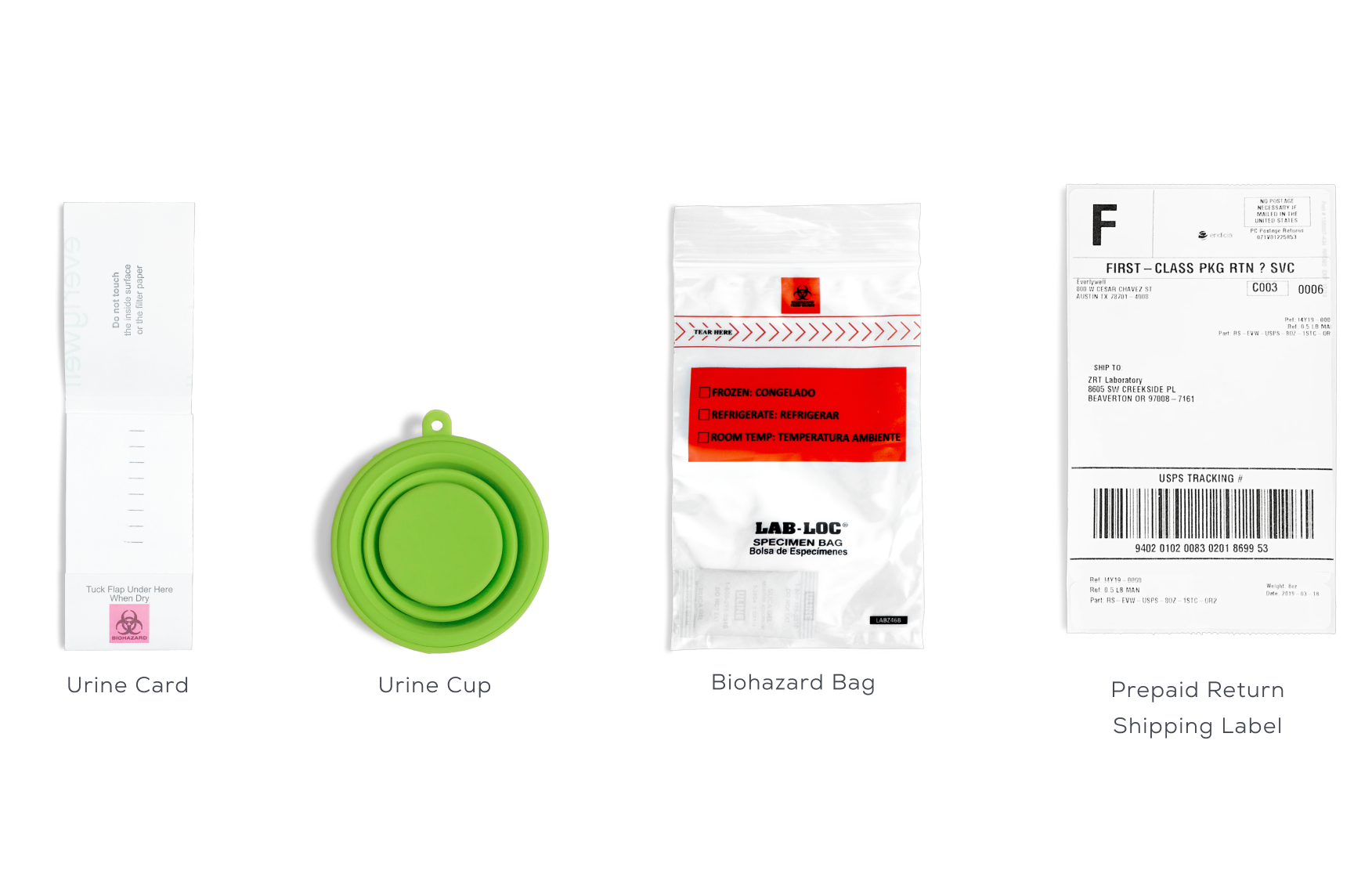








Sleep & Stress Test
$199
Free Shipping • FSA / HSA accepted
This at-home lab test measures daily fluctuations of 3 hormones that can help you determine if abnormal fluctuations in the levels of these hormones may be affecting your ability to get a restful night's sleep.
Measures critical sleep & stress hormones
Urine sample collection
Measure vital hormones to help plan for a better night's sleep









Sleep & Stress Test
This at-home lab test measures daily fluctuations of 3 hormones that can help you determine if abnormal fluctuations in the levels of these hormones may be affecting your ability to get a restful night's sleep.
Measures critical sleep & stress hormones
Urine sample collection
$199
Select Subscription Frequency
YOU SAVE $50 (25%)
YOU SAVE $40 (20%)
YOU SAVE $30 (15%)
Free Shipping • FSA / HSA accepted
Free Shipping • FSA / HSA accepted
Questions?
If you're having trouble sleeping or managing your stress and think that it could be affecting you physically, this is the perfect test for you.
Many times, stress from our demanding modern lifestyles have significant impact on our sleep schedules, which can turn into a vicious self-sustaining cycle. In some instances, it takes objective data to show you or someone close to you that there are risks associated with elevated stress and lack of sleep. Reducing stress and increasing sleep can improve your quality of life, eliminate numerous negative symptoms and reduce the likelihood of long-term health risks.
More than 60 million Americans suffer from some degree of sleep deprivation or insomnia, and over 70% of us feel we suffer from too much stress. High stress and poor sleep are considered major obstacles to feeling well and performing at our best and may be risk factors for many other disease, like diabetes, obesity, and heart disease.
By identifying potential abnormalities in your sleep and stress hormones you can work to reduce your stress, improve your sleep, and live a healthier life.
This panel measures your levels of Cortisol, Cortisone, Melatonin, and Creatinine at 4 points in your day - morning, afternoon, evening, and night.
Your test results will tell whether or not the levels of these four markers are low, normal, or high at each point in your day. Elevations or deficiencies in any of these markers can point to lifestyle improvements you can make to help improve your sleep and stress levels.
This panel is not a sleep disorder test or an at-home sleep test to check for sleep apnea. It does not evaluate Obstructive Sleep Apnea, which is a serious medical condition. If you suspect you have Obstructive Sleep Apnea, see your health care provider for testing options.
Everlywell can provide suggestions for sleep hygiene and lifestyle changes to improve overall health and wellness, including how to better manage stress.
Now put down your electronic device (after buying one of our kits of course) and get some well-deserved sleep. No need to make a doctor's or lab appointment, because our kits come right to you. What a dream!
This at-home sleep and stress hormone test lets you check hormones—like melatonin and cortisol—that are tightly connected to your body’s sleep cycle and stress response.
- The body’s levels of cortisol (stress hormone) and melatonin (sleep hormone) normally follow a regular, 24-hour rhythm or pattern. Melatonin eases you into sleep—and helps you stay asleep—while cortisol helps maintain your energy level and keeps you awake.
- Cortisol is normally at its highest level in the morning, which helps you wake up from sleep. Cortisol levels then gradually drop as the day goes by. (If you’re a shift worker and you sleep during the day, cortisol levels will usually be at their highest whenever you normally get your day started—even if that’s the middle of the night.)
- Melatonin normally follows an opposite pattern, with its levels reaching a peak about 3 hours before you wake up. High melatonin levels throughout the night help you stay asleep. Melatonin levels then normally fall in the morning and afternoon, and begin climbing again in the evening to get your body ready for sleep.
This daily—or “circadian”—rhythm of cortisol and melatonin acts like a “clock” that helps keep your body on a consistent schedule of when you’re asleep and when you’re awake. This schedule allows your body to carry out the right activities—like burning sugar to provide energy—at the right time of the day or night.
But if your cortisol and/or melatonin levels aren’t following the normal rhythm, this “clock” will stop working—and many of your body’s activities won’t happen when they should. As a result, you might experience things like depression or a disordered metabolism—which can lead to type II diabetes.
The Everlywell Sleep & Stress Test checks hormone levels at 4 different points in the day, giving you a view into your own body’s daily rhythm of cortisol and melatonin. This may help you discover:
- If your sleep-wake “clock” is working well—and where the problem might be
- What parts of the day are especially stressful for you
- If you are experiencing chronic stress
- Why you haven’t been getting restful sleep (for example, high evening cortisol levels can decrease sleep quality at night)
What is cortisol’s role in the body?
One of cortisol’s main functions is regulating your body’s response to stress—hence, its nickname of the “stress hormone.”
When you experience stress, your adrenal glands release cortisol into your body which temporarily increases your blood sugar for a boost of energy and curbs nonessential functions. This process helps you perform better in stressful situations, such as when you are in danger.
When your body experiences a cortisol imbalance, the amount of cortisol produced in response to any kind of stress can impact important functions in your body as a result of too much or too little cortisol being secreted. Cortisol secretion is mainly controlled by three inter-communicating regions of the body; the hypothalamus in the brain, the pituitary gland and the adrenal gland.
In addition to managing your stress response, cortisol also helps your body regulate a number of other key functions linked to your health.
Common symptoms of elevated stress and sleep deprivation:
- Depression
- Anxiety
- Can't get to sleep or stay asleep
- Frequent or early waking
- Morning or evening fatigue
- Feeling “tired but wired”
- High stress
- Irritability / impaired performance
- Hunger / sugar cravings
- Weight gain
If you are having issues related to sleep or stress, taking an at-home cortisol test may be helpful for you to understand what may be causing your symptoms.
Cortisol regulates how much sugar (glucose) and fat gets stored in your body and how much is released to use for fuel. That’s why a cortisol imbalance can lead to changes in weight, energy, and other symptoms.
Cortisol is also your body’s main stress hormone. When your body is stressed, your adrenal glands release a burst of cortisol, sending blood flow into your muscles and increasing your blood sugar—giving you a boost of energy. Stressors can be psychological (work deadlines or financial stress, for example) or physiological (such as exercise, eating, or smoking), and various activities of day-to-day living all cause physiological stress that results in spikes of cortisol.
But lots of stress for a prolonged amount of time can lead to chronically elevated cortisol levels. This may increase your risk of health issues including:
- Sleep problems
- Anxiety
- Depression
- Digestive problems
- Headaches
- Heart disease
- Increased weight
- Difficulty remembering
Cortisol testing (with a cortisol test kit, for example) can be useful because it can help you see if your cortisol levels are very high (or very low)-potentially causing symptoms-so you can discuss possible next steps with your healthcare provider.
How is cortisol measured?
Wondering how to test cortisol levels? First off, it’s helpful to know that urine, saliva, and blood are all widely used for measuring cortisol.
Cortisol urine test - The kidneys filter cortisol out of your bloodstream and into urine, making it possible to test cortisol levels with urine samples. This kind of test measures free cortisol—or cortisol that isn’t attached to proteins. (A portion of cortisol circulating in the bloodstream is bound to proteins, while the rest is unbound—or free.) For that reason, this type of test is also known as a urinary-free cortisol test. The Everlywell at-home Sleep and Stress Test is urinary free cortisol test.
Because it’s easy to collect urine samples at different times throughout the day, urinary free cortisol tests are useful for checking how your cortisol levels change over a 24-hour period, which can help provide insight into sleep problems, stressors, and more.
In addition, urinary free cortisol tests are often used for disease monitoring in patients with Cushing's syndrome—a condition in which the adrenal gland makes too much cortisol.
Cortisol saliva test - Saliva measures cortisol because cortisol circulating in the bloodstream can enter saliva through a biochemical process called diffusion. Cortisol saliva tests measure the body’s amount of free cortisol. Late-night salivary cortisol—measurement of cortisol in a saliva sample collected late at night, often around midnight—is a reliable way to screen for Cushing’s syndrome.
Cortisol blood test - Cortisol circulates in the bloodstream, so a blood sample can be used to determine cortisol levels. Some blood tests measure free cortisol, while others measure total cortisol. (Total cortisol levels include both free and bound cortisol). Blood total cortisol tests are helpful for diagnosing various conditions, such as adrenal insufficiency in patients with critical illnesses like severe pneumonia and respiratory distress syndrome.
If you suspect that you may have a cortisol deficiency or excess cortisol, our at-home Sleep & Stress Test can help you easily check your cortisol, cortisone, and melatonin levels from the convenience of your home. If test results reveal potentially abnormal cortisol levels, it’s recommended to share your results with your healthcare provider who may advise further evaluation.
Check cortisol levels at home with the Everlywell Sleep & Stress Test
The Everlywell test comes with everything you need to collect a urine sample from home and send it to a lab (a prepaid shipping label is included within the kit). You’ll get your test results quickly—just days after your sample arrives at the lab—and you can view your results in days on our secure, online platform.
How is this cortisol urine test different from a cortisol saliva test?
The Everlywell Sleep & Stress Test uses urine samples—instead of saliva—for measuring cortisol levels. Urine samples are easy to collect, so this cortisol test is a convenient way to measure your cortisol levels at different times of the day. By taking this at-home lab test, you may be able to learn if you have unusually high or low cortisol levels.
Is there a home cortisol test?
The Everlywell Sleep & Stress Test lets you check how your cortisol hormone levels (as well as levels of cortisone and melatonin) change over a 24-hour period-from the comfort and convenience of your home, which can help you understand whether your cortisol levels are higher or lower than the normal range.
How to test cortisol levels at home with the Everlywell Sleep & Stress Test
(1) Order the Everlywell test online.
(2) Once it arrives, register your kit online using the unique ID that comes inside your kit.
(3) Follow the sample collection instructions inside the kit.
(4) Place your sample inside the return bag included within the kit. Then, put the bag back inside the kit box.
(5) Send the box back in the return envelope using the prepaid shipping label provided.
(6) After the lab tests your sample, check your results on our secure, online platform.
Would you like to order this test?
Shipping Address
,